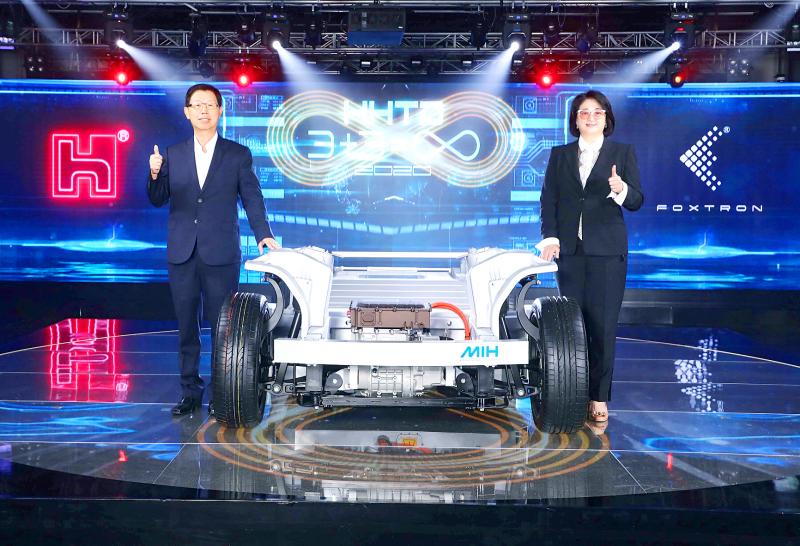Hon Hai Precision Industry Co (鴻海精密) is to develop an electric vehicle (EV) with Fisker Inc, as part of the electronics manufacturer’s efforts to boost its automotive capabilities at a time when technology companies including its main customer, Apple Inc, are looking to expand into vehicles.
The vehicle would be targeted at multiple markets, including North America, Europe, China and India, and sold under the Fisker brand, the firms said in a statement on Wednesday.
Production is set to start in the fourth quarter of 2023.

Photo courtesy of Hon Hai Precision Industry
Californai-based Fisker is looking to break new ground with its second planned model. The start-up plans to make a vehicle that does not fit into an existing segment, like a sedan or SUV.
Its partnership with Hon Hai is pinned on hopes that the collaboration would bring innovative manufacturing.
“The auto industry is very stale,” Fisker founder Henrik Fisker said in an interview.
“We still talk about adopting the Toyota manufacturing system,” he said, referring to a production and logistics concept that was developed decades ago.
Fisker plans to design and market the vehicle, while Hon Hai would supply the chassis, and manage supply chain and assembly.
That is asking a lot of a firm that has never built vehicles in large volume before.
“I have full confidence that they can do this and maybe have ideas that are outside the box,” Fisker said of Hon Hai.
Shares of Fisker rose 39 percent to a record US$22.58 at the close in New York. Hon Hai shares advanced as much as 5 percent in Taipei.
Hon Hai in October last year introduced its first-ever EV chassis and a software platform aimed at helping automakers bring models to the market faster.
This month, Hon Hai chairman Young Liu (劉揚偉) said that two light vehicles based on the platform would be unveiled in the fourth quarter.
The firm is also planning to help launch an electric bus, he said.
Hon Hai is expected to build more than 250,000 vehicles annually for the Fisker partnership, the statement said.
The manufacturer might choose to make some of them in the US, a person familiar with the matter said.
Following Wednesday’s memorandum of understanding, the two sides said that they would enter a formal agreement in the second quarter.
Fisker is the second battery-powered vehicle venture founded by its namesake founder, a longtime vehicle designer. Its debut model, the Ocean electric SUV, is scheduled to start production late next year.

GROWING OWINGS: While Luxembourg and China swapped the top three spots, the US continued to be the largest exposure for Taiwan for the 41st consecutive quarter The US remained the largest debtor nation to Taiwan’s banking sector for the 41st consecutive quarter at the end of September, after local banks’ exposure to the US market rose more than 2 percent from three months earlier, the central bank said. Exposure to the US increased to US$198.896 billion, up US$4.026 billion, or 2.07 percent, from US$194.87 billion in the previous quarter, data released by the central bank showed on Friday. Of the increase, about US$1.4 billion came from banks’ investments in securitized products and interbank loans in the US, while another US$2.6 billion stemmed from trust assets, including mutual funds,

Micron Memory Taiwan Co (台灣美光), a subsidiary of US memorychip maker Micron Technology Inc, has been granted a NT$4.7 billion (US$149.5 million) subsidy under the Ministry of Economic Affairs A+ Corporate Innovation and R&D Enhancement program, the ministry said yesterday. The US memorychip maker’s program aims to back the development of high-performance and high-bandwidth memory chips with a total budget of NT$11.75 billion, the ministry said. Aside from the government funding, Micron is to inject the remaining investment of NT$7.06 billion as the company applied to participate the government’s Global Innovation Partnership Program to deepen technology cooperation, a ministry official told the

Taiwan Semiconductor Manufacturing Co (TSMC, 台積電), the world’s leading advanced chipmaker, officially began volume production of its 2-nanometer chips in the fourth quarter of this year, according to a recent update on the company’s Web site. The low-key announcement confirms that TSMC, the go-to chipmaker for artificial intelligence (AI) hardware providers Nvidia Corp and iPhone maker Apple Inc, met its original roadmap for the next-generation technology. Production is currently centered at Fab 22 in Kaohsiung, utilizing the company’s first-generation nanosheet transistor technology. The new architecture achieves “full-node strides in performance and power consumption,” TSMC said. The company described the 2nm process as

Even as the US is embarked on a bitter rivalry with China over the deployment of artificial intelligence (AI), Chinese technology is quietly making inroads into the US market. Despite considerable geopolitical tensions, Chinese open-source AI models are winning over a growing number of programmers and companies in the US. These are different from the closed generative AI models that have become household names — ChatGPT-maker OpenAI or Google’s Gemini — whose inner workings are fiercely protected. In contrast, “open” models offered by many Chinese rivals, from Alibaba (阿里巴巴) to DeepSeek (深度求索), allow programmers to customize parts of the software to suit their